- Home
- Jennifer Donnelly
Rogue Wave Page 2
Rogue Wave Read online
Page 2
The creature stared at her with his big black eyes.
he said.
Serafina looked at the mirror again. The silverfish had taken her a very long way down the endless Hall of Sighs and had deposited her here. The glass in front of her was broken with jagged edges, and attached to its frame on only two sides. If she sucked in her stomach and turned sideways, she might be able to swim through it, but she wasn’t sure and she didn’t want to take any chances.
Every mirror in the Hall of Sighs corresponded to a mirror in the terragogg or mer world. The other side of this mirror was somewhere in Atlantis, in some ruined room, but where?
It was dark inside the glass. She couldn’t see what awaited her. What if she got stuck? What if she found herself half in and half out, unable to move, with Opafago on the other side? She asked the creature to take her to a different mirror.
The silverfish reared, then slammed back down.
he demanded.
Serafina replied.
Maybe there was another way in and maybe there wasn’t, but it was clear that this was as far as the silverfish would go. She slid off his back and held out the beetles she’d promised him. He ate them from her hand, then dove back under the silver. Serafina was alone.
Atlantis had been a large island. In addition to Elysia, the capital, it had boasted many towns and villages—all of which had been destroyed. Sera knew she could spend ages looking for another way in and never find it. She took a deep breath, and then—hands together over her head like a diver—she swam carefully through the mirror, mindful of its sharp edges. She pulled her tail through and found herself on a rubble-strewn floor. She’d swum out of the mirror realm, but wasn’t sure what she’d swum into.
Only a thin ray of light, shining in through a crack above her, penetrated the gloom. She quietly sang an illuminata spell, pulled the ray to her, and expanded it to fill the space. As her eyes adjusted to the brightness, she saw she was in what was once a large and elegant room of a terragogg house. Two walls had collapsed; the other two still stood. Above her, giant wooden beams that had supported an upper floor slanted down from the upright walls. Debris, all of it overgrown, lay heavily across the beams.
Serafina investigated the space, looking for a way out, but found none. She sang a commoveo spell—again in a quiet voice, wary of alerting anyone or anything to her presence. She used the magic to push against large chunks of stone, but it was no use; it would take a dozen songcasters to budge them. She poked and prodded at the bricks and rubble, but only succeeded in dumping silt on her head.
That’s when she felt it—a vibration in the water. A strong one. Whatever was making it was big. She spun around. Three feet away from her was a large, angry moray. The eel drew herself up and hissed, baring her lethal teeth.
“Eel, please, you I trouble no give!” Serafina cried.
The terrible grammar that came out of her mouth shocked her. What shocked her even more was that her words were in Eelish—a language she didn’t speak.
“What are you doing here?” the eel asked, her voice low and threatening.
I understand her! Serafina thought. How is this possible? Ling’s the only mermaid I know who speaks Eelish.
She realized that she’d understood the silverfish, too. She’d spoken Rursus with him.
Then it hit her: the bloodbind.
When the five merls had mixed their blood and made their vow to work together to defeat Abbadon, some of Ling’s magic must have flowed into her. Had she gotten some of Ava’s, Neela’s, and Becca’s, too?
“I asked you a question, mermaid,” the eel snarled, moving closer.
“Now getting out. Trying,” Serafina quickly replied.
“How did you get in?”
“Through the looking grass.”
The eel’s expression changed from anger to confusion.
“Looking gas. Looking glass. Please, eel, show me the out.”
“There’s a tunnel,” the eel said. “But you won’t fit through it. You’ll have to go out the way you came in.”
“No! Can’t! Bad man there. Please, you eel, the out.”
“I’ll show you, but it won’t do you any good,” the eel said. She swam along the floor to the remains of a collapsed wall. Among the debris was a rock, roughly a foot and a half in diameter. “There,” she said, pointing behind the rock with her tail.
It was so murky in that part of the room that Serafina hadn’t seen the rock, never mind the tunnel behind it. Tugging on the rock now, she loosened it from the surrounding silt, then cast another commoveo to push it out of the way. She took her bag off her shoulder, knelt down, put a hand inside the narrow tunnel, and felt a slight current.
“How long?” she asked.
“Not very. Maybe two feet.”
“I me dig out,” Serafina said.
“Do what you need to do. Just get out of my house.”
Serafina started scooping handfuls of silt from the bottom of the tunnel. She’d enlarged it by a good six inches when she hit something hard and large. Unable to move it, she dug at the top of the tunnel instead, and then the sides, working silt, pebbles, and small rocks loose. She slowly made her way through the narrow passage on her back, blinking silt from her eyes, spitting grit out of her mouth, praying she didn’t loosen something major and bring an avalanche down on herself. When she finally reached the other side of the tunnel, she didn’t stop to look around, but quickly wriggled back into the eel’s house and grabbed her bag.
“Thank me,” she said.
“For what, exactly?” the eel asked.
“No, you. Thank you, eel,” Serafina said.
“Whatever. Just go,” said the eel.
Serafina pushed her bag into the tunnel. The she turned around and reversed into it herself, so that she could pull the rock she’d moved back into place. She didn’t want to leave the eel with a big hole in the side of her house. Shoving her bag ahead with her tail, she squeezed through the tunnel once more. When she finally came out the other side, she saw that she was in open water. Cautiously, she checked for any signs of movement, but saw none. The waters above her were bright. From the position of the sun’s rays slanting through them, she could tell that it was midday. She looked around and discovered that she was at the back of the terragogg house.
Behind it, foothills sloped gently down to the seafloor. The hills were colonized by corals and seaweeds now, but Sera knew they’d probably been terraced for grapes and olives before Atlantis had been destroyed. She swam to the front of the house, hoping to find her bearings.
There, the terrain fell away steeply into a valley. At its center, clustered along what had once been a street, were ruins that went on for leagues. Serafina stopped dead at the sight of them, wonder-struck. She had information to gather, talismans to find, and a monster to hunt down, but she was so overwhelmed, she couldn’t move. Tears came to her eyes.
“Oh,” she whispered. “Oh, great Neria, just look at it!”
Its houses were broken. Its temples toppled. Its palaces ruined.
It was silent. Deserted. Desolate.
But it was still so beautiful.
It was a place Serafina had long imagined, but had never hoped to see.
It was a vanished dream. A fallen empire. A paradise lost.
It was Elysia, the heart of Atlantis.
SERAFINA STARED, not moving, barely breathing.
So much had collapsed during the island’s destruction, but here and there, buildings, or at least parts of them, had survived. She had studied Elysia in school, and had produced several term conchs on its art and architecture.
There in the distance, that bowl-shaped structure—that has to be the amphitheater, she thought. And that huge open space flanked by columns, that’s the agora—the public square. And there’s the ostrokon, which the Atlanteans called a library.
Unable to contain herself a second longer, she cast a canta prax camouflage spell that allowed her to blend into her surrounding
s, just like an octopus. Prax, or plainsong, was the most basic mer magic and took little energy or ability. As soon as the songspell was cast, she swam for the ruins.
In minutes, she was at the outskirts of the city. She swooped down low, determined to enter it as her ancestors had, by its streets. As she swam through them—stopping to touch a column or lintel—forty centuries instantly fell away.
She swam into homes both humble and grand. Time and silt had covered much, but in one house she saw a mosaic portrait of a man, woman, and three children—the family that had lived there. In another, a statue of the sea goddess Neria, miraculously intact. In a third, she saw a human skeleton—a woman’s, she guessed, judging from the bracelets around her wrists and the rings on her fingers. Her delicate bones were furry with algae. Tiny fish swam in and out of her skull. Atlantis is under an enchantment. Who was she? Serafina wondered sadly. Had she known the six mages who had ruled Atlantis? Had she seen their talismans? How Sera wished the dead could speak.
As she was looking at the bones, a sudden movement to her left startled her. Her dagger was in her hand immediately, but it was only a crab scuttling up a wall. She sighed with relief, but the scare reminded her where she was—in the realm of the Opafago. The information she needed was here, she was sure of it, carved into a pediment or chiseled on a frieze. The faster she found it, the better.
Serafina moved on, deeper into the city, alert to sound and motion. As she swam, the camouflage spell she’d cast allowed her body to take on the colors around her—the sandy hues of rubble, the pink and white of coral, the greens and browns of seaweeds. In the center of Elysia, she knew, was the Hall of the Six Who Ruled and temples dedicated to important gods and goddesses. The ostrokon was there, and the agora, too. These public places would be more likely than private homes to have the information she was seeking.
She passed what looked like a wheelwright’s shop, with barnacled hoops still leaning against its front, then a wagonmaker’s and a blacksmith’s. She realized she was in what must’ve been an artisans’ quarter—like Cerulea’s fabra. The street hooked to the left and narrowed; Serafina followed it. The purpose of the shops that lined it became more somber. One had sold funeral biers. Another, shrouds.
At the bottom of the street was what looked like a temple. As Serafina neared it, she saw that its roof and walls were intact, unlike many of the neighboring buildings’. The temple’s massive doors, made of bronze, still hung on their hinges. Strangely, there was no corrosion on them. The stone columns flanking the doors were also intact. Above them were words carved in ancient Greek. Sera struggled with the letters, but eventually she deciphered them, whispering aloud the words they made: “Temple of Morsa.”
Abbadon had uttered similar words: Daímonas tis Morsa—demon of Morsa. Sera’s blood ran cold at the memory. Could this place contain information about the monster? Or the talismans?
No temple had ever been built for Morsa in Miromara, or in any of the mer realms. Merrow had decreed the goddess an abomination who deserved no place in a civilized society.
As she worked up the nerve to go inside, Serafina wondered if Merrow had other reasons for forbidding Morsa’s worship. Just as she wondered if Merrow had other reasons for herding the bloodthirsty Opafago into the Barrens of Thira, the waters surrounding Atlantis.
According to historians, Merrow said that she’d driven the cannibals in the Barrens because the ruins were useless to merfolk. Sera, however, believed Merrow had done so to make sure the true story of Atlantis’s demise was never discovered. According to Merrow’s ancient bloodsong, handed down to Vrăja, the Temple of Morsa was where Orfeo had locked himself during the island’s destruction. Was there something inside it that Merrow also wanted kept secret?
“There’s only one way to find out,” Serafina said to herself.
It was dark inside the temple. The building’s narrow windows let in little light from the waters above. Serafina cast an illuminata to see where she was going, swirling sun rays together. As the ball of light flared in her hands, her eyes widened.
The temple looked exactly as it must have four thousand years ago. Nothing was disturbed. No silt was covering the floor. No algae, anemones, or seaweed had colonized the walls. It was as if even the blind, tiny creatures of the sea knew to shun the goddess.
Sera was amazed that the temple had survived, and was dazzled by its dark beauty. There were towering statues of Morsa’s priests and priestesses carved out of obsidian, with polished rubies for eyes. There were painted panels on the walls depicting her shadowy realm, incense burners made of gold, and silver candelabra. But underneath Sera’s amazement was a growing uneasiness. How has the temple survived all these centuries? she wondered.
Sera released her illuminata, leaving it to float in the dusky water. She swam to the altar, slowing as she saw what was above it—a mosaic, at least twenty feet high, of the fearsome Morsa.
It was only an image, yet it scared her. Morsa, the scavenger goddess of the dead, had once taken the form of a jackal. When she started to practice necromancy, the forbidden art of conjuring the dead, Neria transformed her into a creature so loathsome, no one could bear to look at her.
The creature staring back at Sera from the wall of the temple, with its glittering eyes, was a woman from the waist up, and a coiled serpent from the waist down. Her face was that of a corpse, mottled by decay. A crown of scorpions, their tails poised to strike, sat atop her head. On the palm of one hand rested a flawless black pearl.
What was on the floor of Morsa’s altar, though, frightened Sera even more—a large, deep stain, as deeply red as garnets. She knew what it was. What she didn’t know was why the seawater hadn’t washed it away centuries ago. She was filled with dread as she bent down to touch it, yet strangely compelled.
Driven by the urgency of her mission, Serafina had done a foolish thing—she’d entered a place that had only one way in and one way out.
When the hand came down on her shoulder, she had absolutely nowhere to go.
SERAFINA SCREAMED.
She whipped around and thrust her dagger up through the water, catching her attacker under the chin.
“Maybe I should have knocked.”
“Ling?” Serafina cried in disbelief. Her voice was shaking almost as much as her hand.
Ling tried to nod, but couldn’t. The tip of Sera’s dagger was poking into her skin.
“I could have killed you!” Serafina said, putting her dagger away. “I almost did! What are you doing here?”
“Keeping an eye on you.”
“How did you get into the ruins?” asked Sera.
“I came out of Vrăja’s mirror in Vadus. A vitrina told me I was in the Hall of Sighs. I found a mirror that led to an eel’s house—a very angry eel. When she told me I was the second mermaid who’d invaded her space today, I knew I was on your tail. The tunnel was a bit tight with this thing on my arm,” she said, patting the splint she wore to protect her broken wrist, “but I got through.”
“How did you find out I was going to Atlantis?”
“Ava. You know how she can sometimes see the future? She saw that you were coming here, then used a convoca to contact me. She was really worried, so I told her I’d go after you.”
“I’m sorry, Ling.”
“For what?”
“Almost cutting your head off.”
“No worries,” Ling said, smiling. “If you had killed me”—she nodded at the mosaic—“good old Morsa could bring me back.” Ling swam up high and peered at the ancient inscription over the goddess’s head. “It means Soul Eater,” she said.
Ling was much quicker at translating than Sera. She was an omnivoxa, a mermaid who could speak all languages.
“Soul eater. Wow. That’s comforting,” Serafina said.
Ling swam back down and looked at the altar stone. “Whoa. Is that—”
“Blood? I think so.”
“Why is it still here? How is it still here?”
“I was wondering the same thing,” said Serafina. She reached for the dark stain again.
“What are you doing?” Ling asked.
“Pulling a bloodsong.”
Even after four thousand years, the blood came to life under Sera’s hand. It brightened as if newly spilled, then spun up from the floor in a violent crimson vortex.
The mermaids heard a voice. And then another. And more. Until there were dozens of them. Screaming. Sobbing. Pleading. Shrieking. They sounded so terrified that Serafina couldn’t bear to listen any longer. She ripped her hand away with such force that she toppled backward. The blood spiraled back down into the altar.
Ling had backed herself against a wall. “Something bad happened here,” she said, pale and shaking.
“There’s got to be a way to find out what it was,” Serafina said. “We could comb through more temples. Go to the ostrokon and the Hall of the Six. Read every inscription we can find.”
“Yeah, we could. If we had a year or two,” said Ling. She thought for a moment, then her eyes lit up. “We’re in the wrong place, Sera. Forget ostrokons and temples. What we need is a hairdresser’s. Or a toga shop. Someplace with lots of mirrors.”
“Why?” Serafina said. Then she understood. “Vitrina! Ling, you’re a genius!”
“SO, TELL ME, does my hair look better up? Or down?”
“Four thousand years go by, and this is what she asks us?” Ling grumbled.
“Shh!” Serafina hissed, elbowing her. “Up, Lady Thalia. Definitely,” she said to the figure in the mirror. “It frames your face beautifully that way. And shows off your lovely eyes.”
The vitrina twisted her hair up and pinned it. “Oh, you’re so right! Now, which earrings? The ruby drops or the gold hoops?”
“You do remember that we’re right smack in the middle of a tribe of cannibals, right?” Ling whispered.
Serafina and Ling were in the women’s baths. The building, made of thick blocks of stone, had survived with little damage. One room—maybe a dressing room—contained walls that had been covered with mirror glass. Much of it had darkened, cracked, or fallen away, but there was still one good-size panel that wasn’t too clouded, and in it they’d found Lady Thalia, a noblewoman. She was its first and only occupant, the mermaids had learned. She’d lived in it by herself for the last four millennia.

 Rogue Wave
Rogue Wave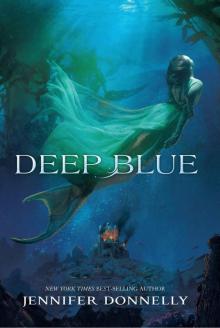 Waterfire Saga, Book One: Deep Blue (A Waterfire Saga Novel)
Waterfire Saga, Book One: Deep Blue (A Waterfire Saga Novel) Revolution
Revolution The Wild Rose
The Wild Rose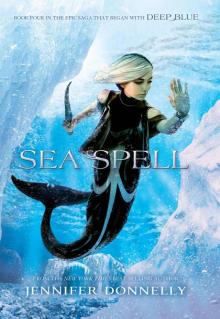 Waterfire Saga (4 Book Series)
Waterfire Saga (4 Book Series) These Shallow Graves
These Shallow Graves Beauty and the Beast: Lost in a Book
Beauty and the Beast: Lost in a Book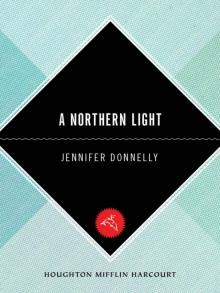 A Northern Light
A Northern Light The Tea Rose
The Tea Rose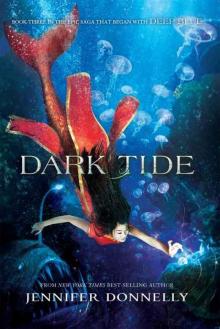 Waterfire Saga, Book Three: Dark Tide: A Deep Blue Novel
Waterfire Saga, Book Three: Dark Tide: A Deep Blue Novel The Winter Rose
The Winter Rose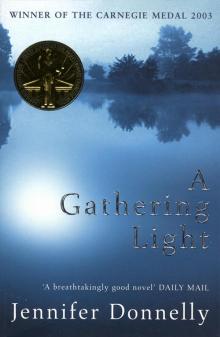 A Gathering Light
A Gathering Light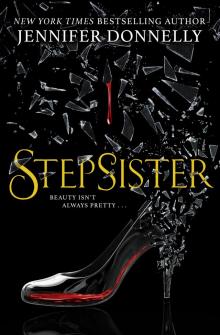 Stepsister
Stepsister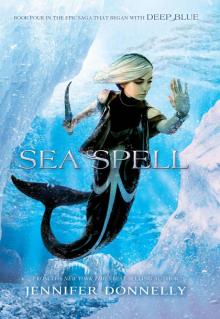 Waterfire Saga, Book Four: Sea Spell: Deep Blue Novel, A
Waterfire Saga, Book Four: Sea Spell: Deep Blue Novel, A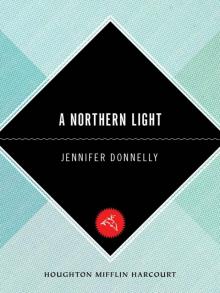 Northern Light
Northern Light Winter Rose, The
Winter Rose, The